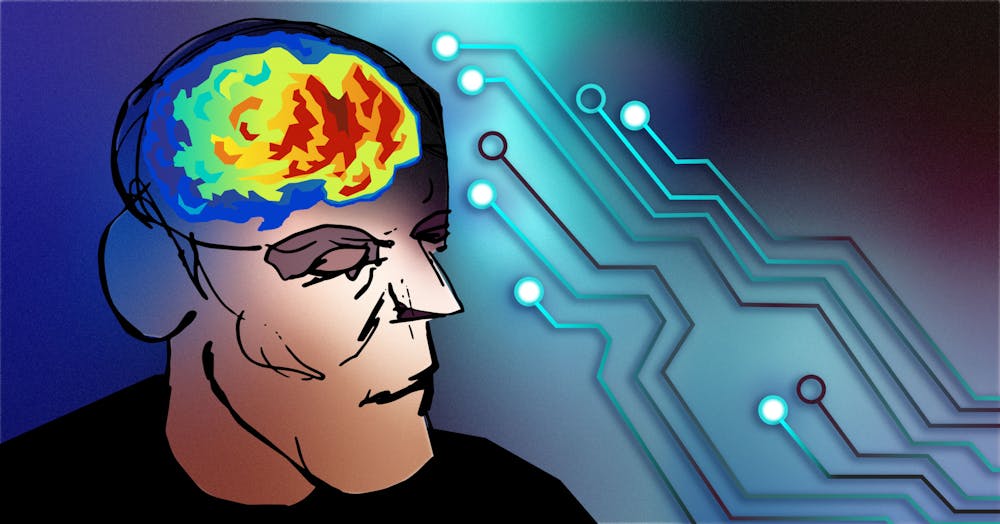If presented with current models of electrical brain stimulation a decade ago, Dr. Adam J. Woods would have thought of a science-fiction movie plot. Artificial intelligence now pulls the fantasy out of screens and into reality.
When patients visit Woods in his lab, he applies two electrodes on their scalps and sends electric currents to their brains. After about sixty seconds of tingling and prickling, the sensation from the shock usually dwindles.
Woods’ laboratory has completed over 6,000 sessions of transcranial direct current stimulation, or tDCS, in the past five years. The procedure shows promise for improving cognitive function in older adults, which may help prevent dementia later in life.
Paired with cognitive training and the help of AI, precision dosing treatment for tDCS may pave the path to preventing dementia.
“It’s no longer science fiction,” he said. “It’s science.”
Dementia is one of the top health care problems both in the U.S. and worldwide, with over 50 million cases in the world today, Dr. Ruogu Fang, UF assistant professor of biomedical engineering, said.
Among the about 6.2 million Americans living with dementia, 85-year-old Richard Irey’s first signs came about seven years ago when his daughter noticed he forgot routine driving directions and grocery list items.
Richard Irey is a retired UF mechanical engineering professor who spent most of his life teaching classes ranging from complex subjects like thermodynamics to sailing — one of his passions.
“He’s very, very intelligent,” his daughter, Elizabeth Irey, said. “That’s part of what’s been so sad about this.”
UF researchers have been working to find noninvasive treatments to fight Alzheimer’s disease and other forms of dementia for years.
However, tDCS efforts have long been hindered by a seemingly simple challenge: how to tailor the treatment to personal anatomical differences like skull thickness and the amount of age-related brain atrophy in each person.
“You walk into your doctor’s office for hypertension medication — they don’t give every single person exactly the same dose of the drug — they titrate that dose based on things like body mass index, height and weight,” Woods said, UF Clinical Health and Psychology associate professor and Center for Cognitive Aging and Memory in the McKnight Brain Institute associate director.
With the aid of a $2.9 million grant from the National Institute on Aging, a solution seems to be on the way using artificial intelligence, which Fang said allows for rapid and holistic interpretation of data that can outpower and exceed human performance.
“Using machine learning, it can make the previously impossible work because of the huge data set and high dimensional data possible today,” she said.
This new research marks an advancement from a crude one-size-fits-all approach to a personalized treatment that can be adapted to every patient, allowing different intensities and directions of brain electric currents to treat each case.
“Because every single dose isn't going to be as effective in every single person,” Woods said.
In conventional tDCS, which applies a fixed dose of electrical stimulation to every patient, an early trial showed moderate improvement in working memory in older adults.
“We think we can enhance those effects significantly by titrating the dose just like you would with a pharmaceutical,” Woods said.
UF has established itself as a national leader with a growing, internationally ranked AI Initiative.
“This project will enable us to generate one of the first personalized medicine approaches to combat age-related cognitive decline,” Alejandro Albizu, a doctoral student in neuroscience at the UF College of Medicine, said in a press release.
Woods and Fang co-lead an over two-year collaboration on a pilot study between the College of Public Health and Health Professions and the College of Engineering. Now, as the lead principal investigators for the project, they are working to combine artificial intelligence and neuroscience research in a journey to prevent dementia.
Fang and the researchers are bridging data on tDCS with AI to disentangle the mysteries behind where and how much of the electrical current goes to each region of the brain.
AI technology analyzes over 6 billion brain MRI data points, Fang said, contributed by 360 study participants to find patterns in tDCS responsiveness. Pairing the patient's unique anatomical makeup with information on whether the treatment caused improvements can inform personalized doses in future patients.
When a new patient supplies an MRI of their brain, researchers may then know where to place the electrodes and the amount and direction of current to apply to make the treatment effective for each person, Fang said.
Preliminary data found dosing may be customizable to turn treatment nonresponders into responders, she said.
In theory, Woods said the generalized AI framework can be applied across a variety of clinical conditions, such as depression and chronic pain, as well as other electrical brain stimulation approaches.
For a growing and aging population, he said dementia is an imminent public health concern. The number of people afflicted with Alzheimer’s will more than triple by 2050.
With dementia running in her family, Elizabeth Irey, 55, said she worries about suffering from the same disease as her dad. She hopes this new technology may allow younger patients to have access to more preventive treatments in the near future.
“There is a pressing public health concern that we need to find novel interventions that are accessible to reduce the incidence of dementia and Alzheimer’s disease,” Woods said.
The projected national cost of providing care for people with dementia is $355 billion in 2021, with the cost rising as high as $1.1 trillion in 2050, according to the Alzheimer’s Association.
“Simply put, our economic health care infrastructure is not built to address that level of increase,” Woods said.
When faced with a dilemma and an unanswered question, he said the best part of the research is getting to find that answer.
Despite being long retired, Richard Irey’s mind still places him back in his youth during his teaching days at UF — reminiscence is a common experience for dementia patients who draw more easily from memories of the past than short-term memory.
“One of the things he’s saying currently is he’s got to go,” Elizabeth Irey said. “He’s got a class to teach.”
Back then, Richard Irey built a 25-foot sailboat. He named it Vorticity, a technical term relating to the wind.
His creations didn’t cease after that. When he was 65, he crafted his own home in the mountains of North Carolina.
Now, while he’s with his family and between bouts of sleep, Richard Irey still asks to go home, talking about what his wife of 65 years believes to be his lakeside North Carolina house and boat.
As his mind blurs the past with reality, his family offers him pictures in hopes of the memories drifting back to his days of sailing.
The potential to make an impact on lives like Richard Irey’s motivates Woods, Fang and the researchers to continue studying dementia and improving its treatments.
“For me, that’s the driving force behind this,” Woods said. “Because we get to go out and actually use our science to maybe help someone.”
Contact Alexandra Harris at aharris@alligator.org. Follow her on Twitter @harris_alex_m.

Alexandra is a senior journalism major reporting on Science/Environment for The Alligator. Her work has appeared in The Gainesville Sun, and she filed public records requests for the Why Don't We Know investigative podcast. She has a passion for the environment.






